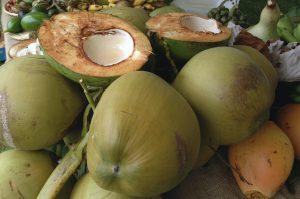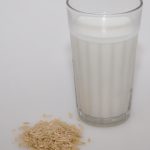 Quick: How many different milks can you name? There’s cow milk, of course, in whole, low-fat, and skim varieties; there’s chocolate and strawberry milk; and many of us are also familiar with soy and almond milk. But if you go to a grocery store or coffee shop, you may find a surprisingly long list of plant-based milks, including rice, oat, cashew, coconut, and even hemp milk!
Quick: How many different milks can you name? There’s cow milk, of course, in whole, low-fat, and skim varieties; there’s chocolate and strawberry milk; and many of us are also familiar with soy and almond milk. But if you go to a grocery store or coffee shop, you may find a surprisingly long list of plant-based milks, including rice, oat, cashew, coconut, and even hemp milk!
With all these milks, it’s easy to succumb to analysis paralysis, frozen in the supermarket aisle, muttering cashew or coconut? Hemp or rice?
Luckily, the UF/IFAS Food Science and Human Nutrition Department has published a series of articles about various nondairy milk alternatives on EDIS. These articles break down the facts about plant-based milks, including how they’re made, how they compare nutritionally to whole, 1%, and skim cow milk, and which are good options for children or infants who can’t consume dairy.
Which plant-based milk should you pick?
 This series also covers potential benefits and risks of these milks and explains the trade-offs in each choice. For example, unsweetened almond, cashew, and coconut milks are very low in calories and carbohydrates compared to even skim cow’s milk. On the other hand, they have little or no protein, one of the key nutritional features of cow’s milk.
This series also covers potential benefits and risks of these milks and explains the trade-offs in each choice. For example, unsweetened almond, cashew, and coconut milks are very low in calories and carbohydrates compared to even skim cow’s milk. On the other hand, they have little or no protein, one of the key nutritional features of cow’s milk.
Soy milk contains comparable protein to cow’s milk while also having lower sugar and saturated fat levels. But soy is one of the eight major food allergens, so it may not be an appropriate choice for everyone.
 Rice and oats are uncommon allergies, so rice and oat milk are good options on that front. Neither contains any saturated fat. And oat milk contains beta-glucan, a fiber shown to decrease LDL (bad) cholesterol. However, both rice and oat milks are low in protein and high in carbs compared to cow’s milk.
Rice and oats are uncommon allergies, so rice and oat milk are good options on that front. Neither contains any saturated fat. And oat milk contains beta-glucan, a fiber shown to decrease LDL (bad) cholesterol. However, both rice and oat milks are low in protein and high in carbs compared to cow’s milk.
Lastly, hemp milk is a relatively new option, and research into its potential benefits is still ongoing. It does contain omega-3 fats, similar to those in fish oil. It also has adequate levels of essential amino acids to be considered a complete protein. The downside is that hemp milk does not compare nutritionally to cow’s milk.
Whether you have dietary restrictions or you’re just curious about a different pairing for your morning coffee or cereal, this EDIS series can help you choose a plant-based milk with confidence. New publications on other nutritional topics and dietary needs come out every week at https://edis.ifas.ufl.edu.
 0
0
